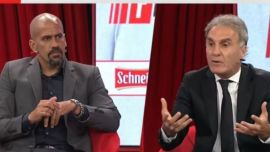Leftist economist Andrés Arauz will face conservative Guillermo Lasso in the upcoming second round of Ecuador's presidential election, officials said Sunday, in a vote marred by fraud allegations and taking place amid a worsening economic crisis.
Thirty-six-year-old Arauz won the first round with 32.72 percent of the vote – not enough to win outright. His opponent in the second round will be ex-banker Lasso, who took 19.74 percent to beat left-wing indigenous leader Yaku Pérez's 19.39 percent, according to the final results of the February 7 poll.
The run-off will take place on April 11, after the first round results were approved by four out of the five members of the National Electoral Council (CNE) at a meeting that lasted into the early hours of Sunday morning.
Pérez, however, said he would appeal. He last week submitted a request for a recount in 17 of the country's 24 provinces, but that secondary tally was suspended Wednesday.
"We're going to challenge thousands of votes," Pérez, a 51-year-old environmental lawyer, said Sunday, before joining indigenous people and supporters marching on the capital Quito.
He has alleged there was fraud to keep him out of the run-off after he was narrowly displaced by Lasso from second to third place in the middle of the count.
"This resistence continues in the legal, judicial, social and political fields," said Pérez, adding that "we cannot allow electoral fraud to remain unpunished."
The marchers, who left last Wednesday from close to the southern border with Peru, are expected to arrive in Quito on Tuesday.
"Rivers of people will arrive, rivers of our hearts to say that our vote is worth defending, our vote must not be stolen. We need to recover the votes," Pérez said.
Lasso, who last week supported Pérez's call for a partial recount, has already started looking forward to the next round.
"Today democracy has triumphed, we are going with courage and optimism to this second round," Lasso said in a statement following the announcement.
Incumbent President Lenín Moreno, whose term in office ends on May 24, did not seek re-election.
Ideological battle
Arauz is the protege of Rafael Correa, a leftist two-time former president currently living in Belgium to evade a conviction for corruption and who remains an influential force in Ecuador.
Esteban Nichols, a political scientist at Quito's Simón Bolívar Andean University, told AFP that Arauz had retained his mentor's electoral base.
"He himself is not the one generating the votes," he said. "People voted for Correa."
The first round result, he added, sets the scene not just for a battle between left and right, but for a "fight between Correism and anti-Correism."
To win, Lasso will have to "seek alliances with antagonists" – such as supporters of Pérez.
Running in his third presidential race, free market advocate Lasso has promised to create a million jobs in a year. He would likely stick to the austerity policies adopted by Moreno, who had to rein in spending in exchange for International Monetary Fund loans to bolster the oil-producing country's faltering dollar-based economy.
Ecuador has been mired in debt since the profits of an oil boom during Correa's presidency dried up under Moreno as the global price of crude crashed.
National debt rose from 26 percent of GDP to 44 percent during Moreno's term.
The coronavirus pandemic has increased the pressure on the economy, with some US$6.4 billion in losses attributed directly to the health crisis, according to government data.
Ecuador's economy is forecast to contract 8.9 percent in 2020, while unemployment reached 8.6 percent last September – more than doubling in nine months.
– AFP
























Comments